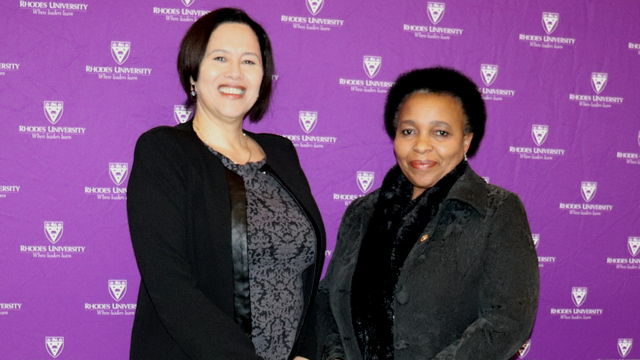
By Liivha Rasimphi, first-year BCom student
The Registrar of Rhodes University, Dr Adéle Moodly, held a public lecture on 5 August, posing the question: Are there divergence in perspectives pertaining to pathways of women to positions of leadership in Higher Education?
Inspired by Women's Month, Dr Moodly highlighted that although it has been more than 25 years of democracy in South Africa, there are still concerns around the low numbers in representation of women in leadership and also the perceived reluctance of women to consider such positions.
Statistically-speaking, within the 26 public universities in South Africa, only 15.38% have women as vice-chancellors, she said.
"The perception is that enough has been done to create spaces for women to navigate a trajectory towards leadership in various sectors," she explained. "As much as we are living in a democracy and living in a democratic space, the experiences of the girl-child and women in various spaces of our society are still oppressive."
She believes women should strive to attain positions of influence in order to be beacons of hope for young children and women.
"The literature reflects that our spaces in society are still extremely gendered and patriarchal and women and girl-children are the ones most oppressed," she stated.
Women in positions of leadership, said Dr Moodly, have an opportunity to influence the gendered, patriarchal structures of not only our institutions, but also the fabric of our societal cultures.
"Women need women as role models, just as much as women need men to speak up and to advocate for women as equal to men in our society," she asserted.
Driven by this motivation, Dr Moodly undertook a research project titled, "Voices on and of women in leadership" with co-researcher and co-publisher, Dr Noluthando Toni, which commenced at the University of Fort Hare.
As part of her research, Dr Moodly engaged men in university leadership positions, including vice-chancellors, to share their views concerning the challenges at hand. The general view of these men was that there are non-verbalised barriers and challenges experienced by women which impact on their trajectory towards leadership.
Amongst these are the continued gendered character of university institutional cultures tilted towards masculinity, as well as the prevalence of what is referred to as the "old boy's network" system which leads to a culture of exclusion for women. “It is important to remember that for many women, leadership is manifested as a culture of service and this should not avert opportunities for accessing executive leadership,” she said. Formal support structures have to be put in place that embrace and facilitate this form of leadership.
Dr Moodly addressed the misconception that women in leadership positions do so simply for personal recognition and gain. "It is not an easy path, as it calls for discipline and strength. And we cannot stand silently when we have both the strength and discipline to influence power relations within our spaces," she said.
She believes a society does not transform unless there is agency both from within the society and also on the part of those in leadership. “Change in the leadership dynamic influences the trajectory of society as a whole,” she said.
Finally, Dr Moodly proposed a need to reconstruct the university environment policies and strategic plans to create a more flexible environment for both men and women to thrive. She also urged that the deconstruction of normative assumptions which are based on various customary notions, should be built into policies. .
“There is an urgency for women to be in the foreground of transformation in leadership. And there is an urgency for men in leadership not to be complacent in agitating for formal support structures and disrupting the gendered character of university spaces,” she said.
“Failure to do so may also reflect as failure in the redress of the marginalisation of women and the girl-child in our society, and failure in promoting social justice, from a position of influence and power”, she concluded.
